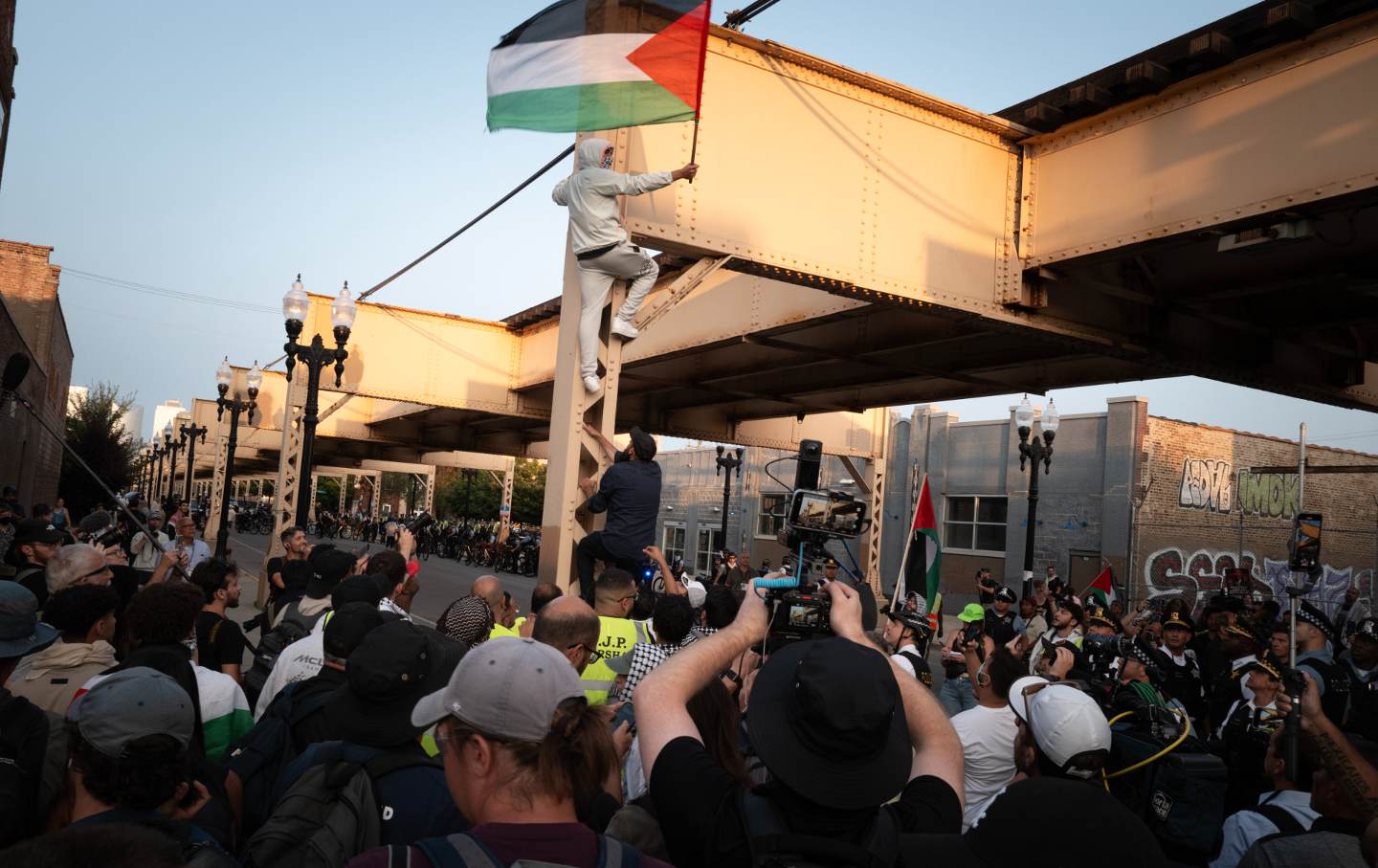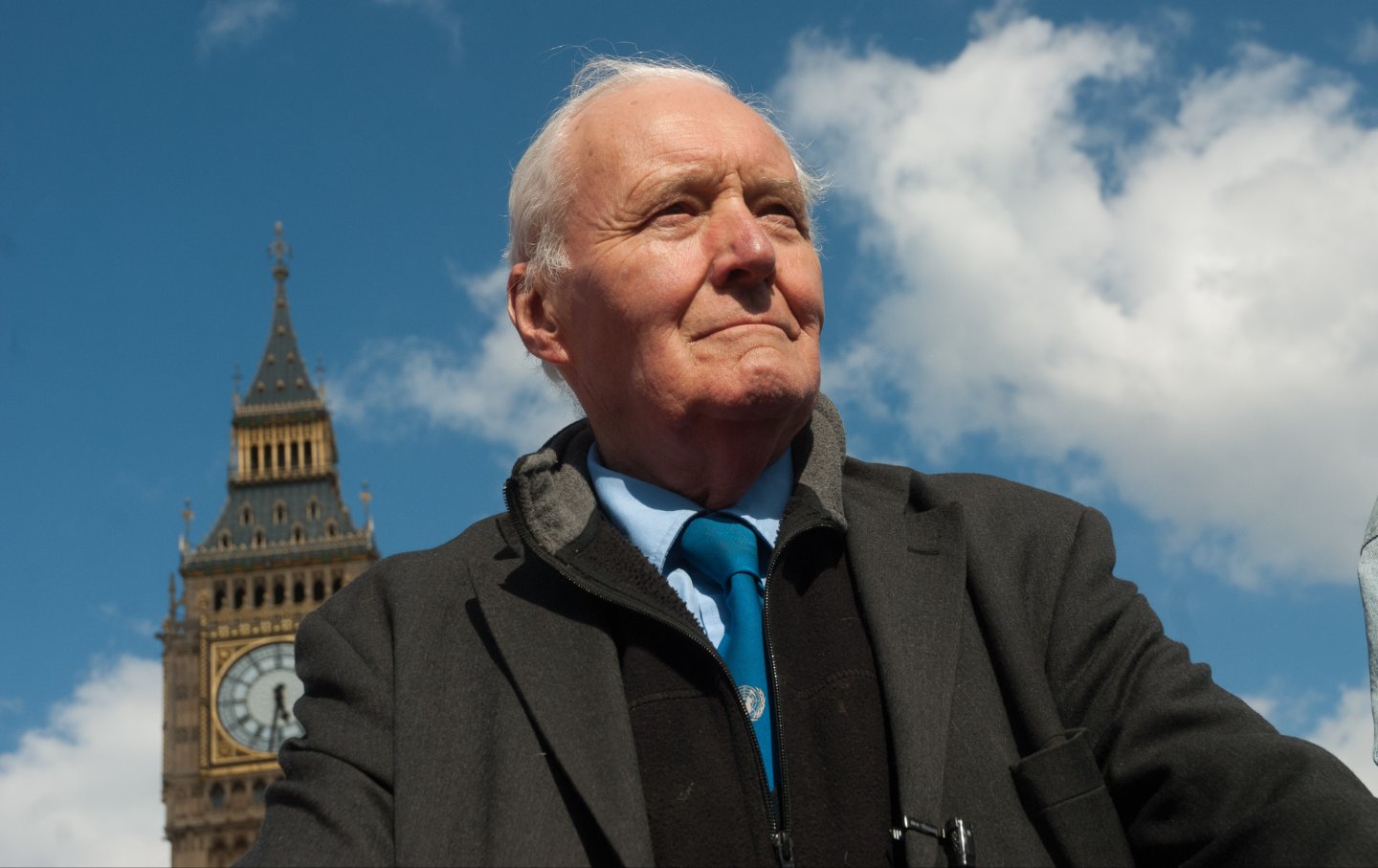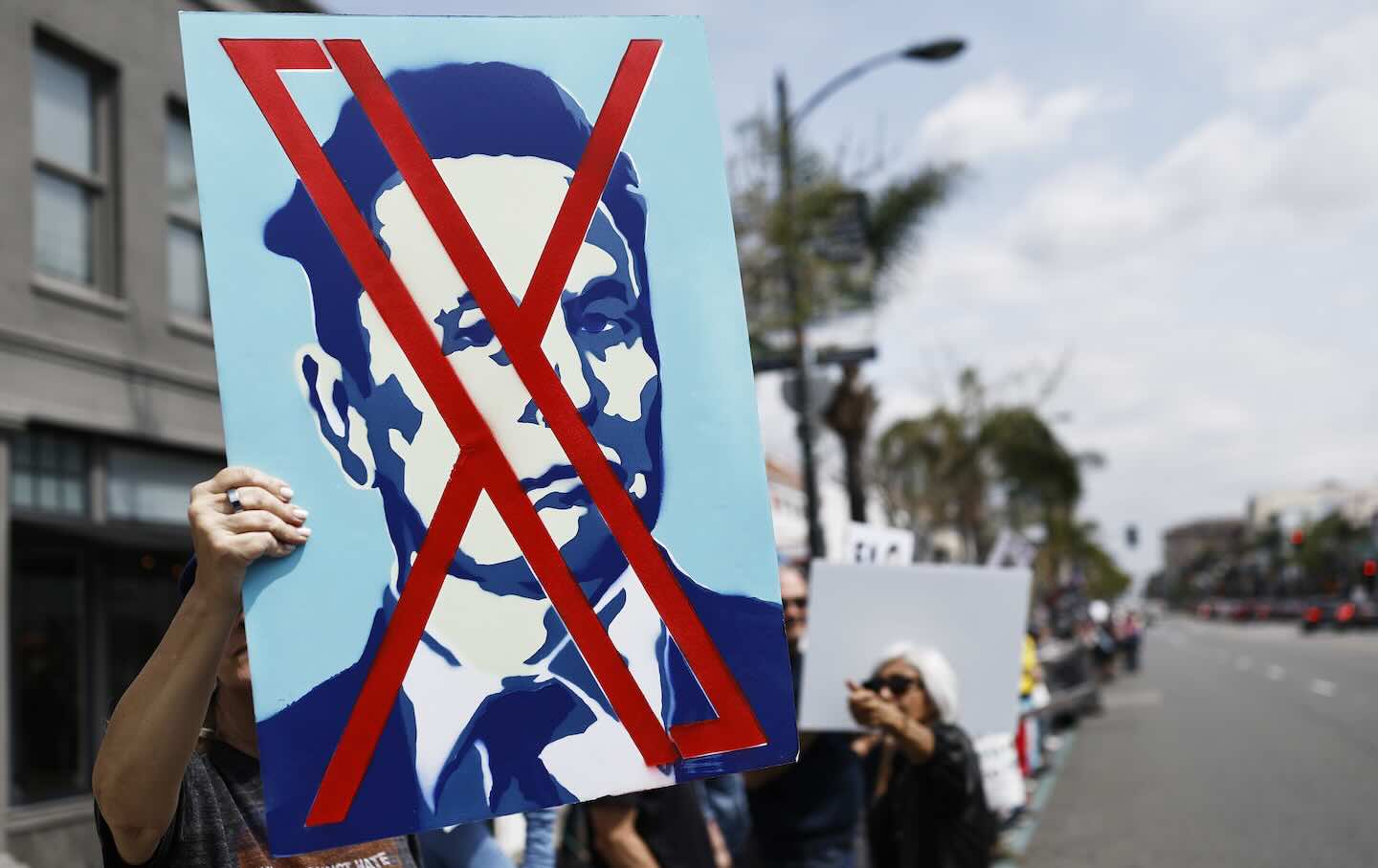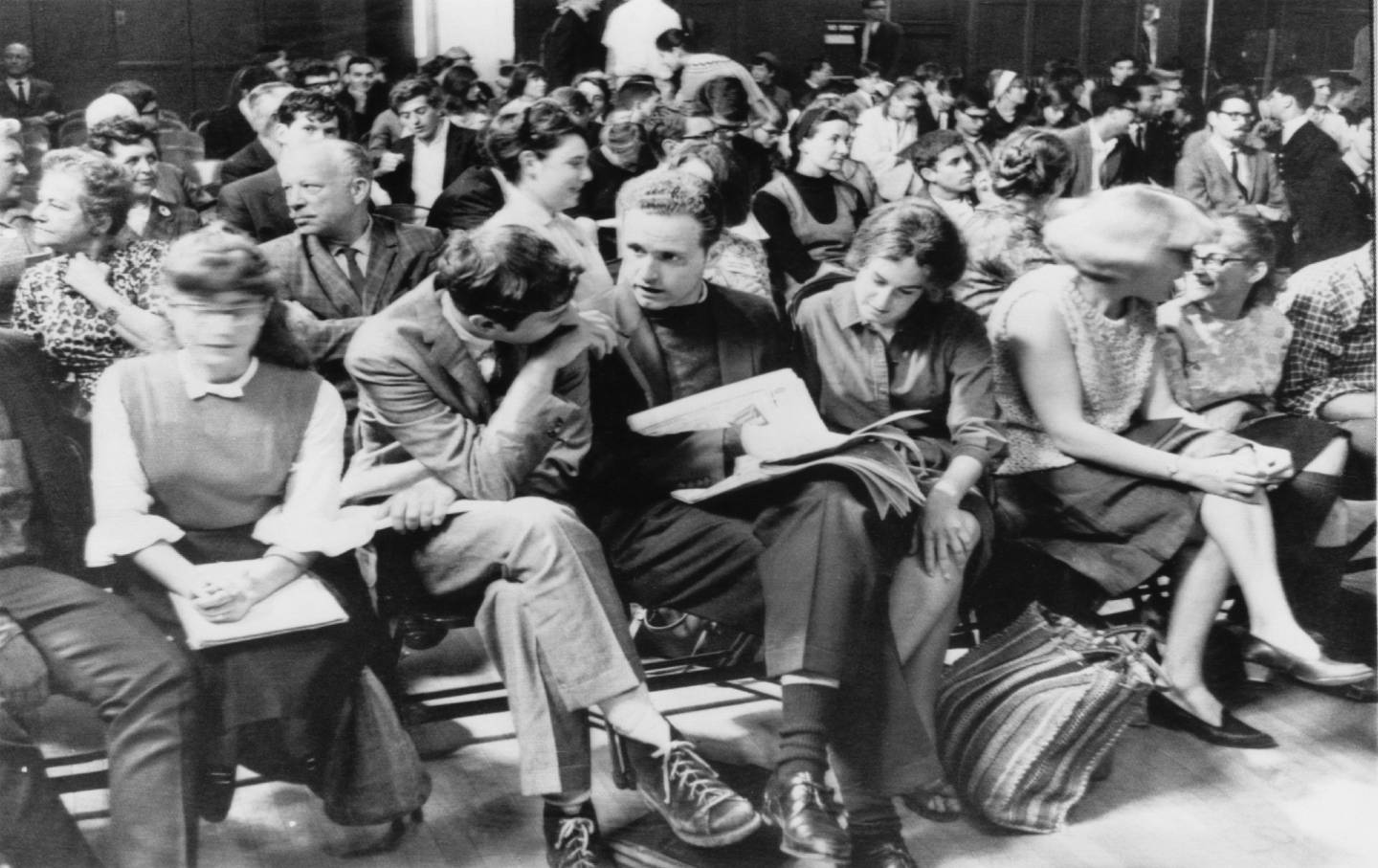Palestinians Will Speak Whether Democrats Want Them to or Not
The party may have successfully prevented Palestinians from addressing the DNC. But it cannot hold back the tide forever.

Anti-war demonstrators march near the United Center where the Democratic National Convention s taking place on August 21, 2024, in Chicago.
(Scott Olson / Getty Images)Despite months of planning, intensive organizing, and a set of clear demands, the 2024 Democratic National Convention was an undeniable disappointment for the Uncommitted National Movement. The group’s demand for an arms embargo against Israel remains elusive at best, and the Democratic platform makes only passing references to Palestinian statehood and our rights to dignity and security. Perhaps most gallingly, the DNC refused the Uncommitted movement’s request to allow a Palestinian American to speak to the convention for just two minutes.
Not everything was a bust, however. Uncommitted secured the first-ever panel on Palestinian human rights in the DNC’s history, and the demand for a speaker united a variety of interest groups, from organized labor to Black and left-wing Jewish groups, behind it.
Beyond that, the dynamics that were revealed by the events in Chicago—both the major setbacks and the minor victories— are quite useful for those of us who want to look to the future.
It is important to get some key things about the Uncommitted movement and its approach to the convention straight.
First and foremost, while the fight over a convention speaker attracted the most attention, an arms embargo remains the central demand of the Uncommitted movement and of many Palestinian-American and Arab-American voters. As many have pointed out, it is not tenable to say that you are for a ceasefire while also providing the very means for the fire. And in light of a blockade on Gaza which illegally impedes the delivery of food and medicine to civilians, military assistance to Israel almost certainly violates US and international humanitarian law.
Opposition to this flow of weapons is not a fringe view. A CBS poll from June found that 61 percent of all Americans, including 77 percent of Democrats, oppose sending military aid to Israel right now, and recent polls conducted by YouGov and the Institute for Middle East Understanding show that an arms embargo and permanent ceasefire could enthuse key swing- state voters. While it would be incorrect to say that such a policy shift would be uncontroversial, it’s clear that there is a real and growing bloc of Americans who sympathize with the Palestinian plight. Even more than that, they are getting organized.
Second, the request for a speaking slot on the stage of the convention was neither a new demand nor a controversial one. It was submitted a month and a half ago. Uncommitted’s initial request was to give time to Dr. Tanya Haj-Hassan, an intensive care doctor who bore witness to Israel’s genocidal carnage while volunteering at Gaza’s Al-Aqsa Martyrs Hospital. In the end, the movement relaxed its request and asked for a Palestinian-American from their list of options to speak on the pain of Palestinians in the war. Despite the symbolic, conservative nature of this request, Democrats still refused—even though they allowed Rachel Goldberg and Jon Polin, the parents of an Israeli American hostage, to speak (something that Uncommitted publicly supported).
So where does this leave Uncommitted—and, for that matter, the Democratic Party?
On the one hand, the DNC’s callous treatment of Uncommitted showed just how deep the antipathy toward Palestinians runs within the upper echelons of the party—and reflected the Harris campaign’s calculation that it will pay a very limited political price, if any, for antagonizing the movement. Playing by the rules didn’t work out like some insisted it would because, while the cause of Palestinian liberation is more popular than ever, the Democratic leadership seems to think it’s still 1982. Failure to compel changes by working “within the system” over the last six months or so will no doubt give fuel to those who are looking for reasons to reinforce their cynicism about electoral politics and the Democratic Party as a vehicle for change.
On the other hand, if leading Democrats had intended to suppress virtually all talk of Palestine—and to erase Palestinians themselves from the conversation— they failed. After being denied a speaking slot, Uncommitted’s leadership launched into action and conducted a sit-in outside of the convention with the hope of compelling a reversal. The demand for a speaker garnered the support of various organizations and leading members of the party, from the United Auto Workers and Bend the Arc to every member of the Squad. By the final day of the convention, support was also coming in from some of the relatives of Israeli hostages.
While support for a simple two-minute speech is by no means translatable into support for an arms embargo, it is clear that Democrats miscalculated if they assumed that denying Palestinians a basic right to be heard would go without uproar. By making the decision to put talented State Representative Ruwa Romman (who, full disclosure, is a friend of mine) at the forefront, with a speech that primarily focused on Palestinian suffering and the need to enforce US law toward “friend and foe alike,” Uncommitted showed the party to be not only intransigent but also wildly irrational.
These miscalculations drew numerous comparisons to the 1964 Democratic National Convention’s refusal to listen to the Mississippi Freedom Democratic Party and its leaders as they pleaded for an end to apartheid in the American South. The likes of Fannie Lou Hamer sought to make members of the Democratic coalition decide if they were for equality or Jim Crow. Similarly, Uncommitted wants to make Democrats confront the results of their party’s policy on Palestine and decide if not another bomb will go to killing civilians or if they will continue to support apartheid in Palestine.
Is that enough? Of course not—particularly given the urgent need to end the genocide this minute. Will it change the trajectory of this election? It’s impossible to say. But it is something that can be built upon, and various strategies will continue to be used while navigating this hostile political terrain.
There is a deeper lesson to take from the DNC: that, whether the Democratic Party likes it or not, the movement for Palestine is growing stronger and stronger.
Prior to the impromptu sit-in, Ta-Nehisi Coates wrote a moving piece in Vanity Fair on the struggle to make Palestinian liberation matter at the DNC. Coates ended his piece with a nod to Edward Said, writing that “the Palestinian permission to narrate was still under consideration.”
While that’s true for the leaders of the Democratic Party, the broader picture tells a different story. Palestinians are narrating their suffering and their aspirations no matter how much leading Democrats would like them to stop, and more of the party’s base is listening with each passing day.
It’s not just the likes of Rashida Tlaib and Ruwa Romman anymore; thousands of Arab Americans are more politically engaged than ever before and organizing around the issue of Palestine. Those who are familiar with the rhetoric and promises of both Republican and Democratic presidents past won’t be satisfied with vague references to dignity, security, and Palestinian self-determination in an acceptance speech, either. It’s time for the Harris-Walz campaign, and a future Harris-Walz administration, to prove that it’ll be different.
Popular
“swipe left below to view more authors”Swipe →This is not an issue that will go away, even if Harris does manage to tamp it down over the next few months. Without an internationally coordinated campaign for Palestinian self-determination, which will require nothing less than the enforcement of international law via an arms embargo and meaningful sanctions on the Israeli state for its settlement of occupied Palestinian territory, it is unlikely that any ceasefire in Gaza will actually be permanent. Without an end to the horrible and oppressive occupation of Palestine, the issue will only become an even bigger stress test on the party’s credibility than it is today. And without an end to the apartheid system that suppresses more than 7 million Palestinians and denies millions more the right to visit and return to their homeland, there will never be meaningful peace.
Equal rights, dignity, self-determination—these are words that sound nice when said the first time, but become hollow if uttered only to escape having to do anything. Until words are turned into action, and until Palestine is free, Palestinians and their allies from all backgrounds will continue to organize—and there is nothing Democratic leadership can do about that.








